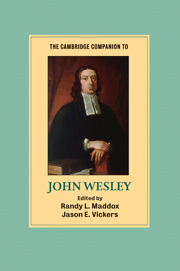3 - Wesley in context
from Part II - Wesley’s life
Published online by Cambridge University Press: 28 September 2010
Summary
The civil wars and constitutional dislocations of the mid-seventeenth century exercised an enduring influence over British politics and religion from which neither John Wesley nor his progenitors were exempt. Wesley's great grandfather (Bartholomew Westley) and grandfather (John Westley) were victims of the great ejection of nonconforming clergy in 1662; his father Samuel was an ex-Dissenter turned “high church” Anglican priest; and his mother Susanna, the daughter of an eminent Dissenting minister, also turned tables when she became a “high church” Anglican with thinly disguised Jacobite sympathies. Although both of John Wesley's parents were high church Tories, they fell out over William, Prince of Orange's legitimacy as king, which his father accepted and his mother rejected. The seriousness of their disagreement, which was anything but a mere marital spat, indicates how profoundly divided Anglicans were over their increasingly incompatible devotion to divine right monarchy on the one hand and their hostility to Roman Catholicism on the other. The Catholicism of the later Stuart monarchs forced Anglicans to make a most unwelcome choice, which could bifurcate consciences, friends, and families. In this way, the vicissitudes of the Stuart dynasty played out in family squabbles within the Wesley household - with its large number of children, variously estimated between seventeen and nineteen, the great majority female.
- Type
- Chapter
- Information
- The Cambridge Companion to John Wesley , pp. 60 - 78Publisher: Cambridge University PressPrint publication year: 2009
- 1
- Cited by



